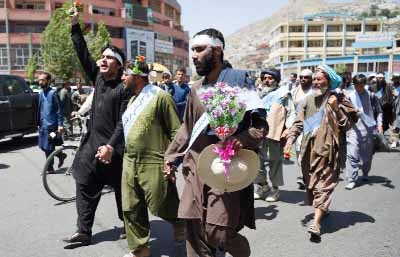
AFP, Kabul :
Dozens of peace protesters arrived in Kabul on Monday after walking hundreds of kilometres across war-battered Afghanistan, as the Taliban ended an unprecedented ceasefire and resumed attacks in parts of the country.
Exhausted after their 700-kilometre (430-mile) trek, most of it during the Islamic fasting month of Ramadan, the marchers walked double file through the Afghan capital shouting “We want peace!” and “Stop fighting!”
“We want our people to stay united for peace and get rid of this misery for the next generation,” Mohammad Naikzad, one of the marchers, told Tolo News.
“I am calling on both sides-the government and the Taliban-for God’s sake… find a way for peace and reconciliation.”
Fellow peace marcher Karwan urged the Taliban and the government to work together to “bring lasting security in this country”.
“Enough blood has been shed. So many people have been martyred in this ongoing conflict,” he told Tolo News.
The Taliban refused to extend their three-day ceasefire beyond Sunday night despite pressure from ordinary Afghans, the government and the international community.
Taliban fighters attacked security forces in numerous districts of eastern and southern Afghanistan, officials told AFP, but there were no details on casualties.
Defence ministry spokesman Mohammad Radmanesh told AFP there had been “very few” reports of fighting since the government on Saturday extended its own ceasefire with the Taliban for another 10 days.
“We hope the Taliban accept the Afghan nation’s call for peace,” Radmanesh added.
·The peace march, believed to be the first of its kind in Afghanistan, emerged from a sit-in protest and hunger strike in Lashkar Gah, the capital of the southern province of Helmand which is a Taliban stronghold.
That demonstration, which began spontaneously after a car bomb attack in the city on March 23, triggered similar movements by war-weary Afghans nationwide.
But when the Taliban and security forces failed to heed their demands to stop fighting, some protesters decided to take their message directly to the country’s top leaders.
Initially ridiculed for their plan to walk from Helmand to Kabul, the marchers now enjoy strong public support.
They are calling for an extended ceasefire, peace talks and a timetable for the withdrawal of foreign troops from Afghanistan-which is also a key demand of the Taliban.
The Taliban announced Sunday they would not extend their ceasefire with Afghan police and troops despite describing the truce as “successful” and a demonstration that the militants were united.
“The mujahedeen across the country are ordered to continue their operations against the foreign invaders and their domestic stooges as usual,” the group said in a statement.
Dozens of peace protesters arrived in Kabul on Monday after walking hundreds of kilometres across war-battered Afghanistan, as the Taliban ended an unprecedented ceasefire and resumed attacks in parts of the country.
Exhausted after their 700-kilometre (430-mile) trek, most of it during the Islamic fasting month of Ramadan, the marchers walked double file through the Afghan capital shouting “We want peace!” and “Stop fighting!”
“We want our people to stay united for peace and get rid of this misery for the next generation,” Mohammad Naikzad, one of the marchers, told Tolo News.
“I am calling on both sides-the government and the Taliban-for God’s sake… find a way for peace and reconciliation.”
Fellow peace marcher Karwan urged the Taliban and the government to work together to “bring lasting security in this country”.
“Enough blood has been shed. So many people have been martyred in this ongoing conflict,” he told Tolo News.
The Taliban refused to extend their three-day ceasefire beyond Sunday night despite pressure from ordinary Afghans, the government and the international community.
Taliban fighters attacked security forces in numerous districts of eastern and southern Afghanistan, officials told AFP, but there were no details on casualties.
Defence ministry spokesman Mohammad Radmanesh told AFP there had been “very few” reports of fighting since the government on Saturday extended its own ceasefire with the Taliban for another 10 days.
“We hope the Taliban accept the Afghan nation’s call for peace,” Radmanesh added.
·The peace march, believed to be the first of its kind in Afghanistan, emerged from a sit-in protest and hunger strike in Lashkar Gah, the capital of the southern province of Helmand which is a Taliban stronghold.
That demonstration, which began spontaneously after a car bomb attack in the city on March 23, triggered similar movements by war-weary Afghans nationwide.
But when the Taliban and security forces failed to heed their demands to stop fighting, some protesters decided to take their message directly to the country’s top leaders.
Initially ridiculed for their plan to walk from Helmand to Kabul, the marchers now enjoy strong public support.
They are calling for an extended ceasefire, peace talks and a timetable for the withdrawal of foreign troops from Afghanistan-which is also a key demand of the Taliban.
The Taliban announced Sunday they would not extend their ceasefire with Afghan police and troops despite describing the truce as “successful” and a demonstration that the militants were united.
“The mujahedeen across the country are ordered to continue their operations against the foreign invaders and their domestic stooges as usual,” the group said in a statement.

